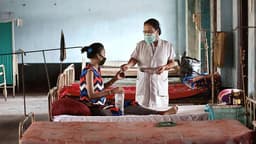Home / Health / Mandatory Health Checks and Worker Training to Combat Air Pollution Risks
Mandatory Health Checks and Worker Training to Combat Air Pollution Risks
12 Nov
Summary
- Mandatory health check-ups and training for construction workers
- CHEST Clinics established in all government hospitals to screen and treat air pollution-related illnesses
- Schools required to shift online during days of severe air pollution
As of November 12th, 2025, the Indian government has taken significant steps to address the growing public health concerns associated with air pollution. The Union Health Ministry has updated its advisory to all states and districts, under the National Programme on Climate Change and Human Health (NPCCHH), with a focus on protecting vulnerable populations.
A key measure is the establishment of CHEST Clinics in all government hospitals, including district hospitals, community, and urban health centers. These clinics will be dedicated to screening, treating, and providing long-term care for patients suffering from respiratory and heart diseases aggravated by poor air quality. The clinics will also maintain detailed patient registers and report cases through a digital system, allowing for better monitoring and response.
Additionally, the government has directed all primary health centers, community health centers, and district hospitals to ensure adequate supplies of medicines, oxygen cylinders, nebulizers, ventilators, and emergency beds. Medical staff will also receive specialized training to manage air pollution-related illnesses.
To further protect construction workers, the advisory mandates regular health check-ups and training sessions. Employers are expected to rotate duties and maintain records of respiratory health monitoring to limit prolonged exposure. Local authorities have also been instructed to enforce strict dust control measures at construction and demolition sites.
The government has also recommended that schools up to grade 5 shift to online classes during days of severe air pollution, with schools required to monitor air quality levels daily and suspend outdoor activities when the Air Quality Index (AQI) turns "poor" or above.
Overall, these comprehensive measures aim to safeguard the health of Indian citizens, particularly the most vulnerable, in the face of the growing public health threat posed by air pollution.



